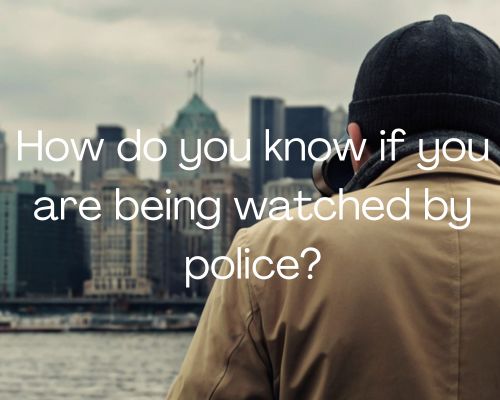Are you feeling like someone might be watching you, but you’re not entirely sure?
Identifying signs of police surveillance can be crucial for your peace of mind and personal privacy. Let us know these with Sherlock Holmes from Ali Private Investigator Tampa.

One of the most telling indicators is noticing an unusual amount of attention from law enforcement. This can include unexpected questions from officers or your acquaintances about you.
You might also observe a pattern of the same vehicles or individuals frequently appearing around your home or workplace. This can create a feeling of unease and signal that you’re being monitored.
Your smartphone can also be a tool for surveillance due to its GPS tracker and repository of calls and messages.
Keep an eye out for unusual data usage on your phone, which could point to spy software if you cannot account for the data being sent.
Additionally, if you encounter frequent dropped calls or hear odd tones during calls, it might suggest your phone line is tapped.
Recognizing these signs early can help you seek the necessary legal advice and take steps to protect your privacy.
Understanding Surveillance and Signs of Police Observation
When you suspect you’re being monitored by law enforcement, there are clear indicators and specific technologies they might use.
Indicators of Being Monitored
There are several physical and behavioral signs that suggest law enforcement may be observing you.
1. Increased Vehicle Presence:
Noticing the same cars parked near your home or workplace frequently is a sign.
2. Following:
Feeling like you’re being followed, whether walking or driving, is another indicator.
3. Contact and Interactions:
Unusual interactions with strangers could indicate undercover cops or informants. Unexplained or repetitive interactions should raise a flag.
4. Visible Surveillance Equipment:
Discovering hidden cameras or microphones in new items, wall plates, electrical outlets, and lamps can signal observation.
5. Digital Evidence:
Monitoring unusual data usage on your smartphone or computer, unexpected text messages, and potential bugging of devices are crucial digital indicators.
Technology and Surveillance Methods
Law enforcement employs a variety of technologies to conduct surveillance.
**1. GPS Tracking:
Devices attached to your vehicle can track your movements.
**2. Eavesdropping Devices:
Bugs can be hidden in everyday items to listen in on conversations.
**3. Wiretaps:
Your phone conversations and text messages may be intercepted.
**4. Video Surveillance:
Hidden cameras can be installed to record your activities.
**5. Digital Tracking:
Software on your phone or computer can track your location and online activity.
Using tools like data management apps and conducting regular bug sweeps of your home and office can help detect these surveillance technologies.
Be proactive in spotting signs and maintaining your privacy.
Legal Implications and Protecting Your Rights
Understanding how to protect your rights and the legal implications of police surveillance is crucial.
It’s important to recognize the protocols law enforcement must follow and know the steps to safeguard your rights and privacy.
Law Enforcement Protocols and Citizen Rights
Law enforcement must adhere to strict protocols when conducting surveillance.
The U.S. Constitution mandates specific rights during police encounters, such as protection against unreasonable searches under the Fourth Amendment.
Officers usually need a warrant or probable cause to conduct searches or place you under surveillance.
If you believe you are under investigation, you can request to see the warrant or subpoena.
Also, be aware of your Miranda rights during any interrogation.
Exercising your rights ensures that you don’t unintentionally incriminate yourself.
Personal Steps and Seeking Professional Help
To protect your privacy and security, consider practical steps if you believe you are being watched.
Be cautious with your communication and avoid discussing sensitive topics over unsecure channels.
Trust your gut instinct if something feels off.
Consulting a lawyer is advisable to understand your legal standing better.
A legal professional can provide advice tailored to your situation. They can help you with public records, background checks, or under investigation scenarios.
Hiring a private investigator like Sherlock Holmes from Ali Private Investigator Tampa, could offer further insights and evidence. This is especially useful during complicated issues like divorce involving an ex-partner.